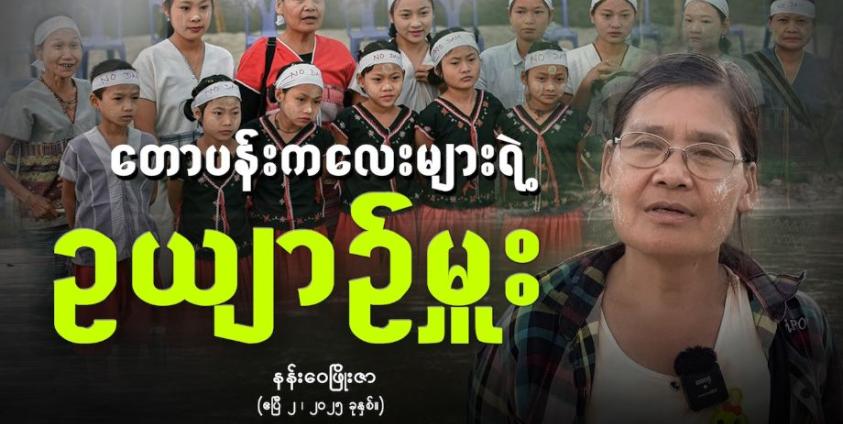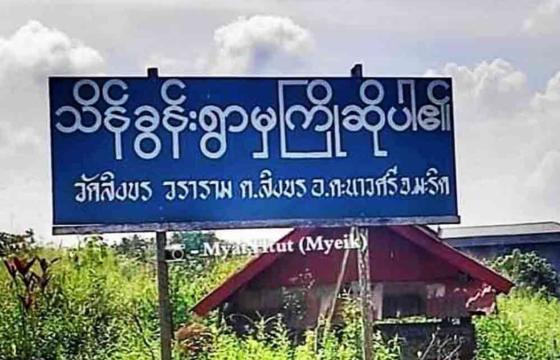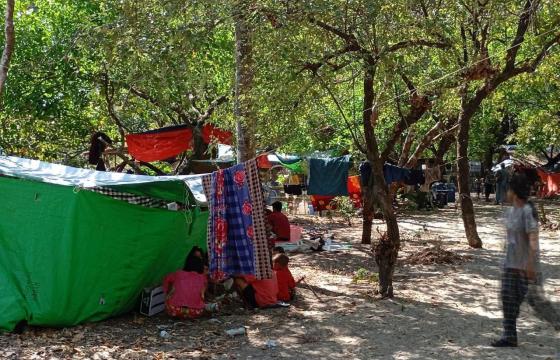Due to the efforts of Naw Say War, the remote village of Kyu Kho in Bu Tho Township in Karen State’s Hpapun District, now has a school and the village children now receive an education.
Naw Say War, a 58-year-old teacher, set up the school six years ago after she first went to Kyu Kho Village and saw that there was no school there.
Seven years ago, whilst travelling through Hpapun District, an area mainly controlled by the Karen National Union (KNU), Naw Say War came across Kyu Kho, a small village made up of a group of huts scattered around at the edge of the forest. She noticed that the children were receiving no education because there was no school in the village. She also realised that most of the adults in the village could not read either.
So, she decided to set up a school in Kyu Kho Village. This was possible because she was single and had no family ties. Talking of that decision she said: “I really wanted to teach the children in Kyu Kho. I felt that being a teacher for the kids there would be so much more meaningful than teaching in places where there were already adequate schools and teachers.”
Naw Say War originally came from Okeshitkone Village in Kyaukkyi Township, Karen State. She left there about 20 years ago and has not returned since the junta’s February 2021 coup, because after that all of Okeshitkone Village, which is in an area where KNU Brigade 3 is active, was displaced by fighting.
Before setting up the school in Kyu Kho, Naw Say War had attended a Christian Seminary in Okeshitkone Village. She then spent two years volunteering with her church at the Mae Ra Moe refugee camp on the border with Myanmar in Thailand’s Mae Sariang District in Mae Hong Son Province. There, she became a teacher at the camp’s school. Over time, the number of teachers at the camp grew, and after teaching there for about 15 years Naw Say War decided to move to Kyu Kho Village, because she felt that her help was more needed there.
Kyu Kho is barely a village, more a remote scattered community of huts. But, despite being so small and remote it has rarely been peaceful.
Many of the parents in Kyu Kho are illiterate and have not been properly educated, so many do not really value education or encourage their children to study.
Naw Say War’s first challenge when she arrived in Kyu Kho Village was to convince the villagers of the value of education. Having done this she persuaded the villagers to come together and built a hut that would serve as a school for the children.
The villagers, who primarily rely on terraced farming for their livelihoods, are all poor and could not afford the necessary facilities and materials for the school. So, Naw Say War reached out to the elders at her church for help. With the support of the church and her friends, she was able to successfully establish and equip an independent school in the village.
Since the school started six years ago it has grown in size. Naw Say War said to KIC: “When the school first opened, there were only 10 students. Now, there are 20. I’m still able to get through each school year because my friends are always there to help. I’ve always used my own money for living expenses, so not receiving a salary isn’t a problem for me.”
Now, with the arrival of two volunteer teachers the school has three staff members. During the current long holidays work has also started on expanding the school building and more desks are being purchased.
Until last year, Kyu Kho Village was still affected by armed conflicts. Previously Naw Say War had to intermittently close her school due to the threat of junta airstrikes. Now, with the junta completely gone from the region, the school can stay open and the students can study without fear.
As well as setting up a school and teaching, Naw Say War has also taken in three children. Aged six and seven years old they are either orphans or their parents live far from the schools. As well as caring for the three children she also educates them for free and covers all their expenses.
“There are three kids staying with me. I’m the only one who can take care of them since their parents and relatives can’t support them. They’re very young, so I have to do all the chores, even washing their clothes,” said Naw Say War.
She has also helped villagers in other ways, including by providing medical care and assisting with funerals.
Villagers only have basic healthcare knowledge and because clinics and hospitals are so far away and transport links to the remote village are so poor they often do not seek out needed healthcare.
Naw Say War explained: “When health problems come up, the villagers usually don’t want to go to the hospital. I usually have to spend a lot of time convincing them. Last year, there was a woman having trouble giving birth who refused to go to the hospital. I had to talk to her seriously, and eventually, she agreed. But the problem is, there’s a junta base between the village and the hospital. There have been incidents where patients who shouldn’t have died did, simply because the villagers had to go around that area to get to the hospital.”
With all her good work, Naw Say War has earned the respect and admiration of the villagers. Not only for teaching the village children but also for sharing essential healthcare knowledge and personally escorting patients to the hospital when needed.
Naw Say War believes that not having a family to hold her back is a significant reason why she was able to adapt easily to the place she chose to settle and to connect with the locals.
She said: “If I had my own family, I wouldn't be able to give my full commitment to the children in the village. I wouldn't be able to teach them. But for now, I’ll keep teaching them as long as I can. I want to expand the school and teach as many children as possible who don’t have the chance to go to school.”
In a remote village, Naw Say War has poured her life into an educational garden, where the young wildflowers she nurtured now blossom and thrive.








